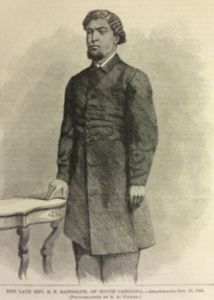
Benjamin Franklin Randolph
*The birth of Benjamin Franklin Randolph is celebrated on this date in 1820. He was a Black educator, an army chaplain, a minister, a newspaper editor, a politician,
Early life
Benjamin Franklin Randolph was born in Kentucky, the child of free Blacks. He moved with his family to Ohio as a child, where he attended school in Warren County, Ohio. He enrolled in Oberlin Preparatory & Collegiate in 1854 and matriculated at Oberlin College in 1857, studying in the Classics Department. In 1858, he moved to Buffalo, New York, where he served as the principal of a public school for black students.
Civil War service
In December 1863, Randolph volunteered to serve in American Civil War for the Union, joining the 26th Regiment Infantry U.S. Colored Troops at Rikers Island, New York, and serving as its chaplain. The only African American officer in the 26th, he received the Regimental banner from Vincent Colyer at the unit's commissioning ceremony on March 27, 1864. Thornton Chase was a commanding officer in the 26th USCT. As Chaplain, Randolph's duties included writing letters for members of the regiment and assisting the regimental hospital attendant, Noah Elliott, with the care of the sick and wounded. The regiment was mustered out in South Carolina in August 1865. After his unit disbanded, Randolph chose to remain in South Carolina during Reconstruction. He attended the Colored People's Convention in Charleston in 1865, subsequently joining the Freedmen's Bureau and serving as assistant superintendent for education in Charleston. In seeking a position with the Bureau, Randolph had written:
I am desirous of obtaining a position among the freedmen where my qualifications and experience will admit of the most usefulness. I don't ask for a position or money. But I ask a place where I can be most useful to my race. My learning and long experience as a teacher North, and my faithful service as Chaplain demand that I seek such a place. If you should obtain for me some responsible position in the Freedmen's Bureau...you would never regret it. -- B. F. Randolph
As assistant superintendent, he established schools for freedmen on various plantations around Charleston and secured teachers for them. Randolph toured established schools throughout the state to review their operations and ensure they were adequately staffed and supplied. Schools visited included those in Columbia, Camden, Darlington, Cheraw, and Marion, SC. in February 1867, Randolph started the Charleston Advocate, a weekly newspaper for freedmen, co-founding it with Rev. E. J. Adams and serving as its co-editor. In March 1867, Randolph petitioned to and was accepted on a provisional basis by the South Carolina Mission Conference of the Methodist Episcopal Church as a minister of their church. Randolph believed that he could more effectively serve freedmen in South Carolina under the auspices of the M. E. church's Mission Conference.
In late 1867 Randolph was elected as a delegate to the South Carolina Constitutional Convention of 1868 under the Reconstruction Laws set by the U. S. Congress. At the Convention, he wrote the article that authorized the first system of free public education in the state. He also authored language granting for the first time the right to vote to landless men, both black and white. Before 1868, landless white men were disfranchised. He also successfully introduced an “equal protection clause”, regardless of race, consistent with the Fourteenth Amendment to the United States Constitution, which South Carolina would ratify the following year. After the Convention, Randolph ran for the Orangeburg seat in the State Senate and was elected to a 4-year term.
The Republican membership also selected him as Chair of the Republican Central Committee for the state, was a delegate to the 1868 Republican National Convention which nominated Ulysses S. Grant for President, and was one of the nation's first African American Electors. He played an important role in establishing the first universal public education system in the state and in granting for the first time the right to vote to black men and non-property-owning European-American men. On October 16, 1868, Randolph was assassinated by members of the Ku Klux Klan.
The 1868 Constitution that Randolph helped create was replaced in 1895 by a Constitution that greatly reduced black voting and legal rights. Nonetheless, several innovations introduced by Randolph were retained, in particular free public education and the franchise for landless men, as well as the “equal protection of the law” clause. Randolph's body was re-buried in 1871 at a cemetery in Columbia established in his honor and named for him. Eight other Reconstruction-era Black legislators were later buried at Randolph Cemetery, as well as bishops, attorneys, and Columbia's first Black postmaster.
In 1995, the cemetery was listed on the National Register of Historic Places. In 2008, the 140th anniversary of the 1868 Constitutional Convention to which Randolph was a delegate, the 117th Session of the South Carolina General Assembly declared February 2, 2008, as “Senator Benjamin Franklin Randolph Day” in conjunction with the unveiling of a historical marker at Randolph Cemetery in his honor.